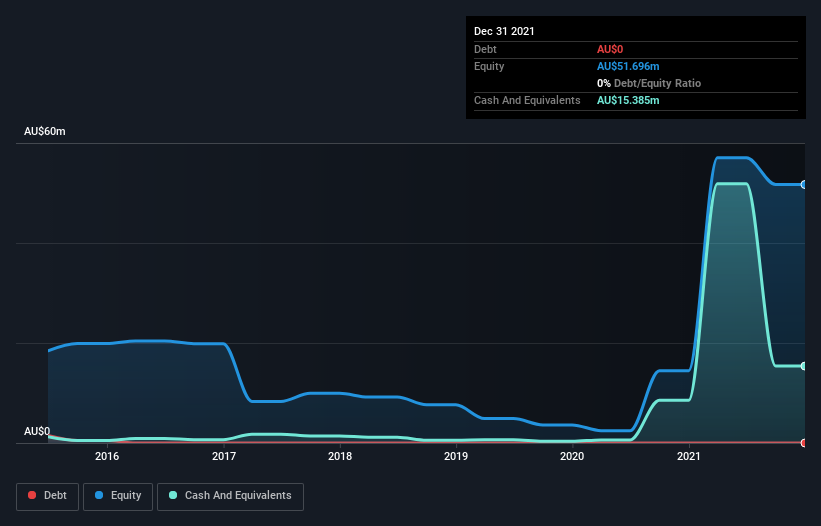Is IOUpay (ASX:IOU) In A Good Position To Invest In Growth?
There's no doubt that money can be made by owning shares of unprofitable businesses. For example, although Amazon.com made losses for many years after listing, if you had bought and held the shares since 1999, you would have made a fortune. But while history lauds those rare successes, those that fail are often forgotten; who remembers Pets.com?
So, the natural question for IOUpay (ASX:IOU) shareholders is whether they should be concerned by its rate of cash burn. For the purposes of this article, cash burn is the annual rate at which an unprofitable company spends cash to fund its growth; its negative free cash flow. The first step is to compare its cash burn with its cash reserves, to give us its 'cash runway'.
View our latest analysis for IOUpay
Does IOUpay Have A Long Cash Runway?
You can calculate a company's cash runway by dividing the amount of cash it has by the rate at which it is spending that cash. In December 2021, IOUpay had AU$15m in cash, and was debt-free. Importantly, its cash burn was AU$15m over the trailing twelve months. That means it had a cash runway of around 13 months as of December 2021. That's not too bad, but it's fair to say the end of the cash runway is in sight, unless cash burn reduces drastically. You can see how its cash balance has changed over time in the image below.

How Well Is IOUpay Growing?
One thing for shareholders to keep front in mind is that IOUpay increased its cash burn by 694% in the last twelve months. While that certainly gives us pause for thought, we take a lot of comfort in the strong annual revenue growth of 50%. Considering both these factors, we're not particularly excited by its growth profile. Of course, we've only taken a quick look at the stock's growth metrics, here. You can take a look at how IOUpay is growing revenue over time by checking this visualization of past revenue growth.
Can IOUpay Raise More Cash Easily?
IOUpay seems to be in a fairly good position, in terms of cash burn, but we still think it's worthwhile considering how easily it could raise more money if it wanted to. Issuing new shares, or taking on debt, are the most common ways for a listed company to raise more money for its business. One of the main advantages held by publicly listed companies is that they can sell shares to investors to raise cash and fund growth. By comparing a company's annual cash burn to its total market capitalisation, we can estimate roughly how many shares it would have to issue in order to run the company for another year (at the same burn rate).
IOUpay has a market capitalisation of AU$37m and burnt through AU$15m last year, which is 39% of the company's market value. That's not insignificant, and if the company had to sell enough shares to fund another year's growth at the current share price, you'd likely witness fairly costly dilution.
So, Should We Worry About IOUpay's Cash Burn?
Even though its increasing cash burn makes us a little nervous, we are compelled to mention that we thought IOUpay's revenue growth was relatively promising. Looking at the factors mentioned in this short report, we do think that its cash burn is a bit risky, and it does make us slightly nervous about the stock. Separately, we looked at different risks affecting the company and spotted 3 warning signs for IOUpay (of which 1 can't be ignored!) you should know about.
Of course IOUpay may not be the best stock to buy. So you may wish to see this free collection of companies boasting high return on equity, or this list of stocks that insiders are buying.
New: AI Stock Screener & Alerts
Our new AI Stock Screener scans the market every day to uncover opportunities.
• Dividend Powerhouses (3%+ Yield)
• Undervalued Small Caps with Insider Buying
• High growth Tech and AI Companies
Or build your own from over 50 metrics.
Have feedback on this article? Concerned about the content? Get in touch with us directly. Alternatively, email editorial-team (at) simplywallst.com.
This article by Simply Wall St is general in nature. We provide commentary based on historical data and analyst forecasts only using an unbiased methodology and our articles are not intended to be financial advice. It does not constitute a recommendation to buy or sell any stock, and does not take account of your objectives, or your financial situation. We aim to bring you long-term focused analysis driven by fundamental data. Note that our analysis may not factor in the latest price-sensitive company announcements or qualitative material. Simply Wall St has no position in any stocks mentioned.
About ASX:OVT
Ovanti
Provides fintech and digital commerce software and services that enable institutional customers to authenticate end-user customers and process banking, purchase, and payment transactions in Malaysia.
Excellent balance sheet with moderate risk.
Market Insights
Community Narratives



